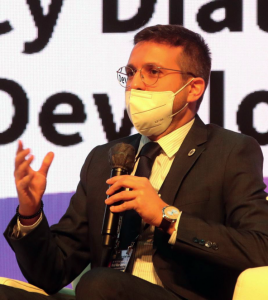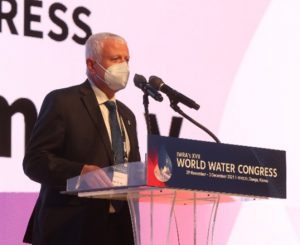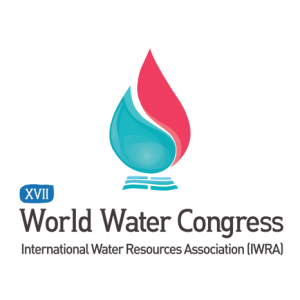
From November 29 through December 3, 2021, the International Water Resources Association (IWRA) held the 17th World Water Congress at Daegu in the Republic of Korea. Under the theme Foundations for Global Water Security and Resilience: Knowledge, Technology and Policy, and focused on resilience and solutions to respond to rising challenges, the Opening Ceremony of the 17th World Water Congress of the International Water Resources Association (IWRA) included the presence of national authorities and experts from all continents and many international organizations, including the Ministry of Environment of Korea, and representatives from FAO, IFAD, the World Bank, OECD, UNESCO, ESCAP, the World Water Council and the European Union, and more.
Representatives from the Texas A&M Energy Institute participated in significant ways at this significant gathering, notably Professor Rabi Mohtar, Chair of the Awards Committee at IWRA and TEES Research Professor at Texas A&M University, Dr. Bassel Daher, Assistant Research Scientist at the Texas A&M Energy Institute and Adjunct Assistant Professor at Texas A&M University, and Professor Gabriel Eckstein, President of IWRA and a Professor of Law at Texas A&M University.
IWRA organizes and supports international water congresses and other events to advance global knowledge, policy, and management of water resources. Since 1973, IWRA has convened the World Water Congress every three years in locations around the world with the objective of providing a meeting place to share experiences, promote discussion, and present research results, new knowledge, and developments in the field of water sciences. For nearly four decades, the World Water Congress has provided a platform for events that identify major global themes addressing the water agenda and bring together a large cross-section of stakeholders to develop and implement decisions in the field of water.
The Texas A&M Energy Institute’s engagement at the World Water Congress included Dr. Bassel Daher, Assistant Research Scientist at the Texas A&M Energy Institute and Adjunct Assistant Professor at Texas A&M University, Professor Gabriel Eckstein, President of IWRA, a Professor of Law at Texas A&M University, and an Energy Institute Faculty Affiliate, as well as Professor Rabi Mohtar, Chair of the Awards Committee at IWRA, TEES Research Professor at Texas A&M University, and an Energy Institute Faculty Affiliate. The following offers brief descriptions of their involvement and some of the outcomes of the Congress.
Interview with Dr. Bassel Daher Reflecting Future Water Challenges
Dr. Bassel Daher was interviewed in the event newsletter:
In 50 years the debates around water management have evolved dramatically and as we saw in the CoP, experts are trying to integrate them in the Climate Change discussions, what other achievements in the last 50 years would you underline regarding water resource management?
As our world continues to face shocks such as pandemics, climate change, conflict, there is a need to improve our ability for rapid response to ensure the resilience and sustainability of water systems. Solutions to many of the challenges facing our water systems will not come exclusively from within the water sector itself. Viewing water-related challenges through a systems lens allows us to understand the tight interconnections between the water system and other biophysical, social, environmental, and economic systems. This, in turn, allows us to develop solutions consistent with the complexity and uncertainty of the anticipated challenges. The past 50 years have seen progress in this direction, yet there remains a need for improved cooperation across sectors and to address the barriers that may hinder collective action. There is also a need for innovation across disciplinary expertise, which should be properly incentivized and supported. See the full interview.
Commentary in Water International
Leading to the World Water Congress, Dr. Daher in his role as Chair of the Early Career and Young Professionals Task Force at IWRA, organized a dialogue session that brought together intergenerational experts across different task forces including ground water, climate and water, water security, water quality, and smart water management. The session outcome was a collaborative commentary reflecting on the water challenges of the past, present, and future: a key theme at the Congress, as IWRA celebrated its 50th Anniversary.
Interview with Professor Rabi Mohtar, Chair IWRA Awards Committee
What are the values under the IWRA Awards?
IWRA is built on a spirit of sharing time, knowledge, and values toward water resources and water professionals. Acknowledging the contributions of IWRA and the water community at large carries important value to IWRA. The Awards, therefore, acknowledge the impact of these individuals on the association and to the water community at large.
The International Steering Committee (ISC)
A distinctive and fundamental piece for the success of this major international water event is the active role of the International Scientific Committees (ISC) of IWRA. The ISC Chairs oversee all arrangements related to the scientific and technical content, including Congress themes and sub-themes agreed with co-hosts and IWRA Presidents, calls for abstracts, special sessions, and side events, selecting papers for oral and poster presentations, determining the schedule for technical sessions, selecting the special sessions, plenary sessions, side-events, and proposing keynote speakers. The ISC Chairs link researchers and practitioners to provide a unique meeting place to share experiences, promote discussion, and to present new knowledge, research results, and new developments in the field of water sciences around the world. This helps, ultimately, toward sustainable management, the use of global water resources, and setting and achieving the goals and objectives for related international water and development agendas. For more on the ISC, click here.
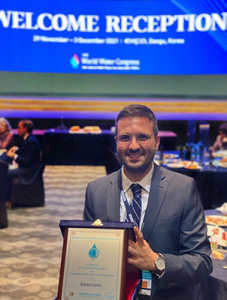
50th Anniversary Special Award for “Expanding IWRA’s Future Development”
As IWRA celebrated its 50th anniversary at the 17th World Water Congress, three special awards were made to three members who have significantly contributed to the association’s past, present, and future. Dr. Bassel Daher, Texas A&M Energy Institute received the award for “expanding IWRA’s future development”.
High-Level Panels and General Program Sessions
The Future of Water Challenges in the Coming 50 years
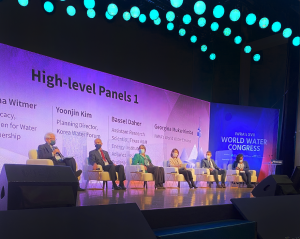
Day two of the Congress began with a High-Level Panel that included IWRA President Gabriel Eckstein, Women for Water Partnership Advocacy Manager Lesha Witmer, Korea Water Forum Planning Director Yoonjin Kim, Texas A&M Energy Institute Assistant Research Scientist Dr. Bassel Daher, and World Water Envoy, Zimbabwe Georgina Mukwirimba, IWRA.
James Nickum, Editor-in-Chief, IWRA, introduced and facilitated the session that explored the water challenges that the world will face in the coming 50 years, and how these will be addressed by IWRA. The session highlighted the relevance of working in partnership and the contribution of IWRA to address issues such as water insecurity and build relevant knowledge through research, policy briefs, and capacity building. IWRA President Gabriel Eckstein noted that “the SDGs are surrounded by unpredictability and they are not milestones that can be achievable in a timeline manner, especially when we face new challenges such as water quality and availability.”
Dr. Bassel Daher, Texas A&M Energy Institute, mentioned the rising challenges witnessed with the COVID-19 pandemic, which obliges us to acknowledge the interconnection between water, resilience, and other sectors. He explained that due to this interconnection, “there is not a single discipline or sector that can address these challenges alone; there is a need for heightened collaboration and for channeled investment to enable the development that cuts across these disciplines to allow a higher level of harmonization and coordinated planning”.
Multi-Stakeholder Science and Policy Dialogue to Support Implementation of Sustainable Development Goals
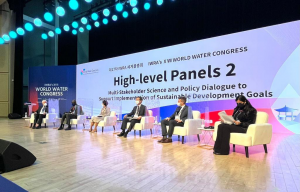
Professor Rabi Mohtar, Chair, IWRA Awards Committee, Dean, Faculty of Agricultural and Food Sciences, American University of Beirut, and Professor, Texas A&M University, moderated this High-Level Panel that initiated a discussion of the role of science in supporting policy decisions in specific countries, like Senegal.
Mr. Abdoulaye Sene, Executive Secretary and Co-Chair of the Preparatory Committee for the Organization of the 9th World Water Forum (Dakar, March 2022), underscored that Senegal is a pioneering country known for its management of transboundary rivers and water management resulting from the support of partners from the sanitation field and the reforms aimed at attracting public-private partnerships (PPPs).
Ms. Nara Lee, Partnership and Liaison Officer and Assistant FAO Representative in Korea, addressed the role that the SDGs are playing in decision making, capacity building, and technical expertise. Regarding the contribution of FAO to SDG6, Ms. Lee mentioned the provision of water data and information for better decision making: an important tool to support members in reducing water stress and increasing water efficiency. She also underscored the relevance of innovation and more effective governance systems, including innovative financing, access to quality water, sustainable management, and increased investment in water infrastructure.
Mr. Jong-jin Lee, Vice President and Chief Global Officer, K-Water, addressed the need for advancing toward carbon neutrality. Mr. Lee stated, “We would like to join the international trends on SDGs, as we decided to implement Environmental, Social and Governance [ESG] elements in K-Water work complying to international measures.” Regarding innovative approaches, he mentioned the relevance of digital technology to establish smart water management tools and renewable energies in Korea. Partnerships were mentioned as one of the needed approaches, as an example, the agreement with the Government of Pakistan was showcased.
Dr. Bassel Daher, Texas A&M Energy Institute, underlined the role of the SDGs in providing a roadmap for governments to achieve sustainable development and commented on specific experiences that focus on SDG6, SDG2, and SDG7. In particular, Daher presented case studies of Morocco, Lebanon, and the US, highlighting the need to bring different stakeholders into the discussion. For more information about the session, see the newsletter.
General Session (GS1.4): Case Studies in Chile, Korea, and Mongolia
Professor Rabi Mohtar moderated the in-person and virtual session that reported on three case studies:
- Drivers for collective groundwater management: The case of Copiapó, Chile
Elisa Blanco Pontificia Universidad Católica de Chile
The analysis showed the relevance of three elements: 1) the existence of neutral and technical mediators that acted as the third party; 2) the identification and empowerment of good leaders; and 3) the limitation of the administrative authority in the community’s decisions.
- Democratic Transition and The End of Water Pricing in Korean Agriculture in Comparative Perspective
James Nickum International Water Resources Association
The project explored the impact of qualitative shifts in institutional frameworks or policy on water pricing and found that major shifts in the larger institutional framework, especially at the constitutional level, can have perverse effects on water security and resilience, either unintentionally or because they give greater emphasis to other types of security such as grain self-sufficiency or maintaining social order. Implications of the project relevant to water security and resilience are embedded in a larger institutional and policy framework and sometimes have some tough competition there.
- Water Security Index: An Application to Ulaanbaatar, Mongolia
Nomundari Erdene TU Braunschweig
With the goal of establishing a comprehensive water security assessment index for the city of Ulaanbaatar tailored to its geography, size, socio-economic system, and level of infrastructure development. The proposed index can provide a snapshot of the water security status of the targeted regions within the capital city, enabling policymakers, financing institutions, and planners to make more evidence-based, and informed decisions on how to improve their performance. The index can be set as a framework for the continued assessment, allowing the benchmarking of the water management performance to track the progress versus regress within the compared time frame. It would also be the basis for a guiding principle comprising technical assistance, recommendations on the directions of the water sector investments, and action plans for the decision-makers and the water authorities.
Daegu Declaration
One key outcome of the 17th World Water Congress is the Daegu Declaration Toward Global Water Security and Resilience,calling for improved cooperation for coherent solutions and addressing the urgent need for dialogue and coordination across disciplines and sectors to address complex water challenges. The importance of water for life and development must be reanalyzed in this regard, not only in connection with sanitation and hygiene but also with sustainable management of water resources and aquatic ecosystems. The declaration is a call for scientists, policymakers, youth, and others. It specifically emphasizes the need for systems thinking and breaking down disciplinary silos to address the complex, interconnected challenges facing the water system.
IWRA Elects New Executive Board for 2022-2024
The Chair of the Election Committee, Dogan Altinbilek, is pleased to announce, after an intense and highly participatory elections process, that a new IWRA Executive Board has been elected. The new Executive Board will take up their posts for three years, beginning January 1st, 2022. The new Board members include President Yuanyuan Li (China), Past President Gabriel Eckstein (USA), Vice Presidents (3) Henning Bjornland (Australia/Denmark), Professor Rabi Mohtar (USA/Lebanon) and Lesha Witmer (Netherlands); Treasurer Renee Martin-Nagle (USA), Secretary General Eric Tardieu (France). Committee Chairs include Awards – Lili Yu (China), Membership- Jun-Haeng Heo (South Korea), Scientific Technical & Publications – Jean Fried (France/USA), and Directors: Guy Fradin (France), Gary Jones (Australia), Karin Krchnak (Slovakia/USA), Birgitta Liss Lymer (Sweden), Trevor Magwaza (Zimbabwe), Ganesh Pangare (India/Thailand), Dahlia Sabri (Egypt/Kuwait), Tom Soo (Australia/France), Pilar Carolina Villar (Brazil), and Tom Williams (UK/India). See details of Member’s background and motivation here.

